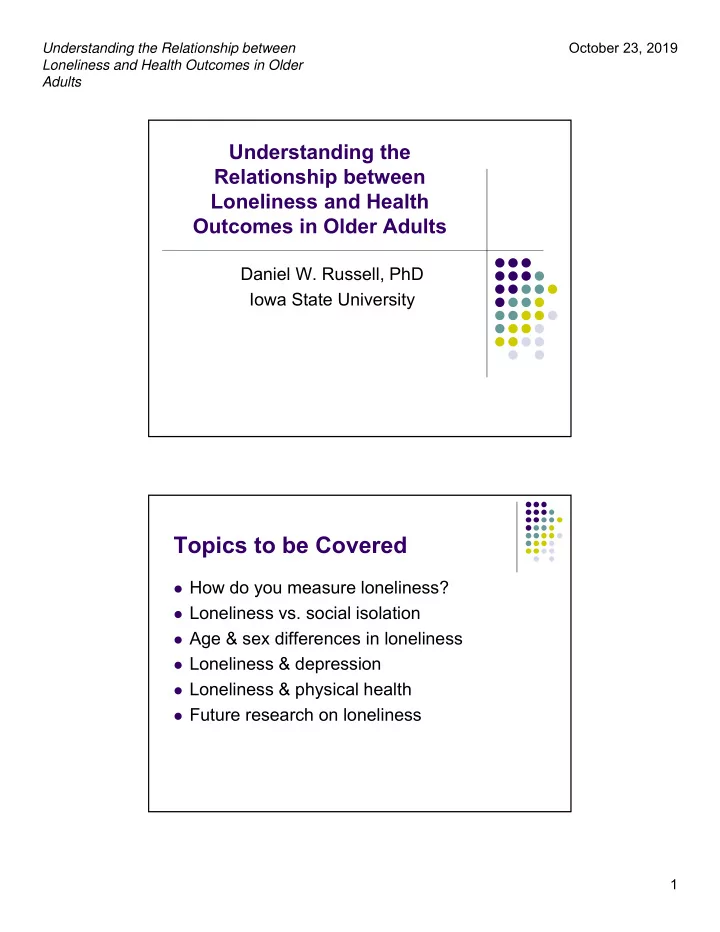

October 23, 2019 Understanding the Relationship between Loneliness and Health Outcomes in Older Adults Understanding the Relationship between Loneliness and Health Outcomes in Older Adults Daniel W. Russell, PhD Iowa State University Topics to be Covered How do you measure loneliness? Loneliness vs. social isolation Age & sex differences in loneliness Loneliness & depression Loneliness & physical health Future research on loneliness 1
October 23, 2019 Understanding the Relationship between Loneliness and Health Outcomes in Older Adults Measuring loneliness “Direct” measures of loneliness Example: “How often do you feel lonely?” Issue: Stigma of loneliness Will individuals be honest in their responses? Social desirability concerns may undermine the validity of such measures “Indirect” measures of loneliness Do not use the term “loneliness” Development of the UCLA Loneliness Scale Has become the most widely used measure of loneliness Initial set of items were based on statements by lonely people describing the experience Revision of the scale in 1980 involved the addition of positive or “non-lonely” items Version 3 involved simplifying the wording of the items to facilitate giving the scale to non- college educated samples 2
October 23, 2019 Understanding the Relationship between Loneliness and Health Outcomes in Older Adults Sample Items from the UCLA Loneliness Scale How often do you feel that you are “in tune” with the people around you? How often do you feel that you lack companionship? How often do you feel alone? How often do you feel part of a group of friends? Loneliness & Social Isolation Is loneliness the same as being alone? Individuals may feel lonely despite having a large number of friends or frequent social contact Other individuals may not feel lonely despite having few friends or infrequent social contact Theoretical model of loneliness argues that how your relationships with others compare with your expectations determine whether or not you feel lonely 3
October 23, 2019 Understanding the Relationship between Loneliness and Health Outcomes in Older Adults Loneliness & Social Relationships Among Older Adults Relationship Measure Loneliness Social Support -.74 Number of Relatives -.17 Number of Friends -.23 Frequency of Social -.16 Contact Age Differences in Loneliness It is commonly believed that older adults are the most lonely Increasing social isolation with age is believed to increase feelings of loneliness Decreases in the size of the social network due to loss of your partner, family and friends Less frequent contact with others due to physical limitations 4
October 23, 2019 Understanding the Relationship between Loneliness and Health Outcomes in Older Adults Cigna Survey - 2018 HRS Loneliness By Age Group 2008-2016 17.5 17.3 17.1 16.9 16.7 16.5 16.3 16.1 15.9 15.7 15.5 50-54 55-59 60-64 65-69 70-74 75-79 80-84 85-89 90+ 5
October 23, 2019 Understanding the Relationship between Loneliness and Health Outcomes in Older Adults HRS Study: Changes in Loneliness Over 8 Years 50-54 55-59 60-64 65-69 70-74 75-79 80-84 Age by Social Contact 6
October 23, 2019 Understanding the Relationship between Loneliness and Health Outcomes in Older Adults Social Support by Age Sex Differences in Loneliness 17.5 17 16.74 16.5 16.39 16 15.5 15 Male Female 7
October 23, 2019 Understanding the Relationship between Loneliness and Health Outcomes in Older Adults Is there a Loneliness Epidemic? 45 40.24 39.8 40 35 2010 2018 Loneliness & Depression Loneliness is considered to be a symptom of depression CES-D: One item assesses the frequency of feeling lonely (“I felt lonely during the previous week”) Measures of loneliness and depression typically correlate from .40 to .70 Research indicates that there are reciprocal relationships between loneliness and depression Issue: Are relationships between loneliness and health due to depression? 8
October 23, 2019 Understanding the Relationship between Loneliness and Health Outcomes in Older Adults Loneliness & Mortality A large number of studies in both the U.S. and other countries have examined the relationship between loneliness and other measures of social isolation with mortality A meta-analysis by Holt-Lunstad et al. (2015) found that loneliness was associated with a 26% increase in the likelihood of mortality A number of studies have indicated that loneliness is related to mortality beyond the effects of social isolation Results did not vary by gender, length of follow-up, or country Effects appeared to be stronger for individuals under 65 years of age Iowa EPESE: Loneliness & Overall Mortality 9
October 23, 2019 Understanding the Relationship between Loneliness and Health Outcomes in Older Adults Loneliness & Coronary Heart Disease (CHD) Loneliness has been found to be related to blood pressure and other variables related to inflammation (e.g., CRP; poorer immune system functioning) Meta-analysis examined the relationship between loneliness and social isolation with CHD & stroke Results indicated poor social relationships were associated with a 29% increase in CHD & a 32% increase in risk of stroke Results did not vary by sex Loneliness & Mortality due to Heart Disease 10
October 23, 2019 Understanding the Relationship between Loneliness and Health Outcomes in Older Adults Loneliness & Mortality due to Respiratory Illness Loneliness & Mortality due to Cancer 11
October 23, 2019 Understanding the Relationship between Loneliness and Health Outcomes in Older Adults Future Research Issues Interventions for loneliness Existing interventions do not appear to be very effective Few studies have attempted to intervene with very lonely individuals Role of the Internet Impact on quality of relationships Interventions that make use of new technology Developing a New Older Adult Loneliness Measure? UCLA Loneliness Scale was developed based on data from college students Does the measure reflect the experience of loneliness among older adults? Is there a need for a “clinical” measure of loneliness? What score reflects a high level of loneliness? Should there be diagnostic criteria for loneliness? 12
October 23, 2019 Understanding the Relationship between Loneliness and Health Outcomes in Older Adults THANK YOU 13
Recommend
More recommend